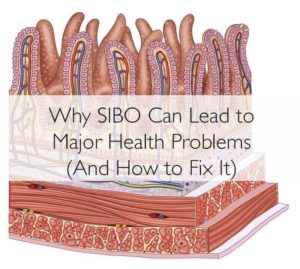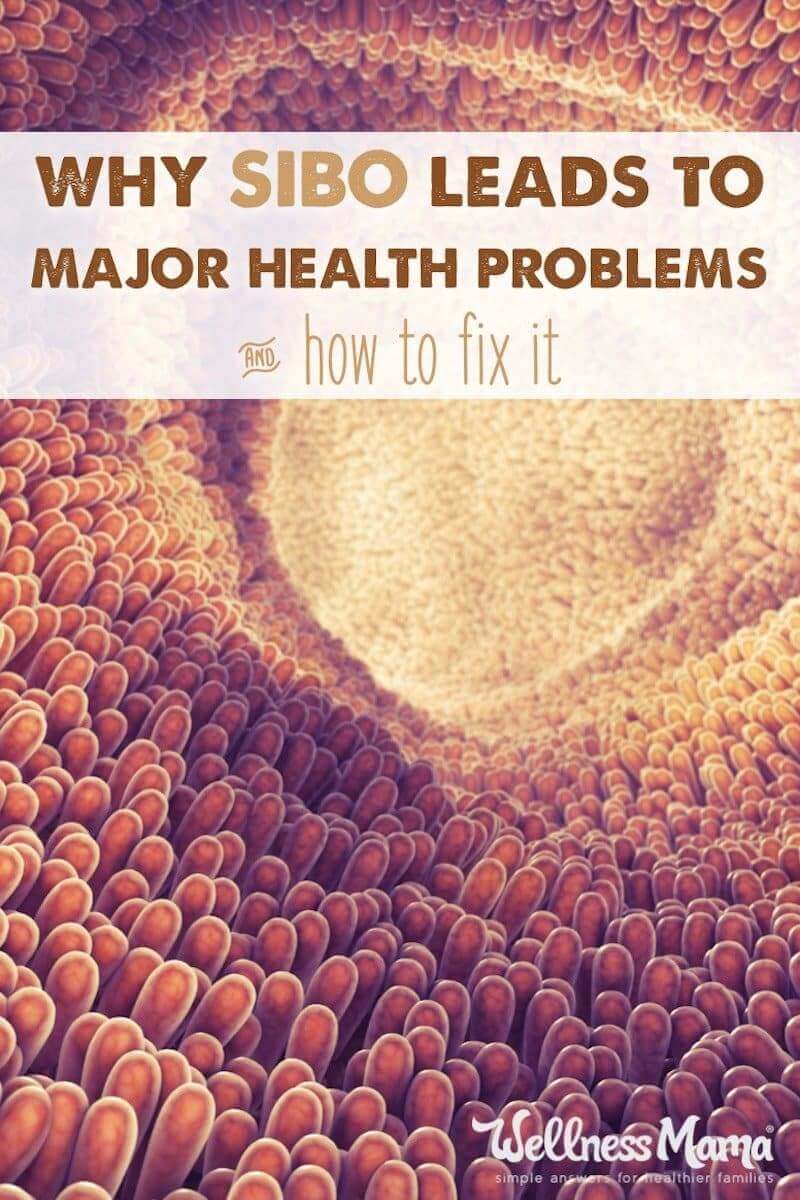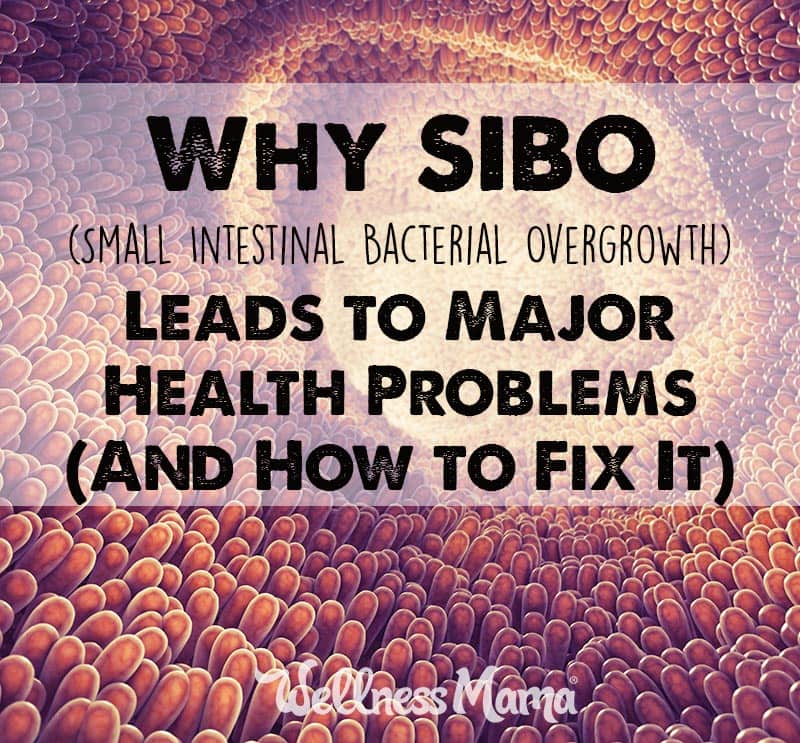Most of us now understand that there are thousands of bacteria living in our digestive systems. Beneficial and pathogenic bacteria co-exist in our digestive tract, and problems can occur when these get out of balance.
Research has linked many conditions like IBS, bloating, leaky gut syndrome, and even Crohn’s disease to imbalances in the gut. New evidence suggests that another, though less well-known, condition contributes to these disorders: Small Intestinal Bacterial Overgrowth (SIBO).
What Is SIBO?
SIBO stands for “Small Intestinal Bacterial Overgrowth.” Nice name … but what is that exactly?
Anatomically, the small intestine connects the stomach with the colon. So bacteria in the digestive tract are normal, right?
Yes and no …
The old saying that there is a time and a place for everything applies here.
Bacteria is normal in the digestive tract, but, with this infection, it isn’t the presence of bacteria that is the problem. The problem is that there is too much bacteria and/or the wrong type of bacteria. The “wrong type of bacteria” doesn’t necessarily mean some weird strain of bacteria wreaking havoc on your gut. Most often, Small Intestinal Bacterial Overgrowth occurs because bacteria that should be in your large intestine (colon) gets into your small intestine. (source)
How Small Intestinal Bacterial Overgrowth Occurs
 The small intestine works to digest food and absorb nutrients into the body. If you want to get technical, it has three parts: the duodenum (food ends up here from the stomach), the jejunum, and the ileum (which moves partially digested food into the colon or large intestine).
The small intestine works to digest food and absorb nutrients into the body. If you want to get technical, it has three parts: the duodenum (food ends up here from the stomach), the jejunum, and the ileum (which moves partially digested food into the colon or large intestine).
The gastrointestinal system does contain bacteria, but these should be in the highest amount in the colon. Comparatively, there should be relatively little bacteria in the small intestine. The small intestine houses different kinds of bacteria than the colon or rest of the digestive system. In fact, you’ll find only about 10,000 bacteria per milliliter of fluid in the small intestine. The colon houses at least 1,000,000,000 bacteria per milliliter of fluid!
As I said, Small Intestinal Bacterial Overgrowth Syndrome (also known as Small Bowel Bacterial Overgrowth Syndrome or SBBOS) occurs when large numbers of the bacteria from the colon migrate to the small intestine and disrupt its balance.
SIBO harms the structure and function of the small bowel. Damage in the small intestine can lead to leaky gut, which occurs when the intestinal barrier is permeable and proteins from food can enter the bloodstream. This may lead to complications like immune reactions, food allergies or sensitivities, generalized inflammation, and even contribute to autoimmune diseases.
Is SIBO Contagious?
Thankfully, no.
Though it is a nasty infection, it is not contagious so you don’t have to worry about it spreading to anyone else.
SIBO Symptoms: Understanding the Problem
The small intestine is the longest part of the digestive system and handles much of the nutrient absorption from food. Problems in the small intestine can quickly lead to nutrient deficiencies and food absorption issues.
Perhaps most problematic: these bacteria living in the small intestine can “eat” B vitamins, such as vitamin B12, before the body can absorb these important nutrients. These same bacteria, when present in the small bowel, consume vital amino acids, causing protein deficiency and an increase in ammonia production. It may also lead to fat soluble vitamin absorption issues.
Main SIBO Symptoms:
- Flatulence and/or belching
- Bloating
- Abdominal pain
- Cramps
- Diarrhea and/or constipation (source)
Risk Factors for SIBO:
Certain groups of people are at higher risk for SIBO, including those with an existing gastrointestinal disorder. Those with autoimmune disease, especially Celiac disease, are also at higher risk.
Other risk factors:
- Medications: Especially those that affect the immune system or digestive tract
- Celiac Disease: A study from the American Journal of Gastroenterology showed that 66% of people with celiac disease had SIBO (even when eating completely gluten free!). (source)
- Diabetes: Another study found this overgrowth in 43% of diabetes patients
- Other Autoimmune Disease: Any condition that compromises the immune system may lead to a higher rate of SIBO
- Aging: Another fun part of aging- those over age 60 have a higher risk than those under 60
- Rosacea: An Italian study found a strong correlation between those with SIBO and symptoms of Rosacea. The study also showed a recovery from Rosacea when the bacterial overgrowth was eliminated (source)
There may also be a connection between oral contraceptive use and SIBO.
Research has identified an association between oral contraceptive pills and bowel disease like IBS and Crohn’s. Of course, correlation doesn’t prove causation, but the association is strong, according to this study.
And alcohol consumption and SIBO:
There is also a clear association with heavy alcohol consumption and small intestinal bacterial overgrowth.
From Chris Kresser:
Heavy alcohol use has long been recognized in association with SIBO (source). This study also found an association between SIBO and moderate alcohol consumption, defined as up to one drink per day for women and two drinks per day for men. Alcohol appears to have effects on several of the normal protective mechanisms, including causing injury to the small bowel mucosal cells, contributing to leaky gut, and decreasing the muscular contractions. Additionally, alcohol may “feed” a few specific types of bacteria contributing to overgrowth (source)
Personal Experience With SIBO
Years ago, my husband’s appendix ruptured, leading to a nasty secondary infection and a lot of really potent antibiotics that saved his life. Obviously, I’m forever grateful to those doctors and those antibiotics, but they did leave behind some gastrointestinal symptoms that were later identified as Small Intestinal Bacterial Overgrowth.
This began my research on this tricky condition and I found that many people seem to struggle with it, even after cleaning up their diets. In fact, my friend Sylvie was diagnosed with it, even after years of clean eating. In her words:
When I first cleaned up my diet a few years ago from the typical standard American diet to a real foods based one, I was astonished at how many health conditions seemed to just disappear week after week. I was feeling more energetic, losing weight with very little effort and even managed to get rid of a couple medications.
Unfortunately, the switch to real food didn’t solve every health issue I had… I was still dealing with histamine intolerance, and IBS (irritable bowel syndrome), which I later found out were both caused by SIBO, which sent me down a rabbit hole of research. The good news is that by treating SIBO I was able to eliminate the symptoms of histamine intolerance and IBS.
Unfortunately, SIBO isn’t as well-known as many other digestive conditions. It’s taken a little while for the medical community to get on board with recognizing this condition, and learning how to treat it effectively.
How do I know if I have SIBO?
This was the first question we set out to answer for my husband.
The only way to know for sure, is to get tested.
Unfortunately, you can’t order the tests yourself. You need to see a doctor or qualified practitioner to order them for you. We saw a naturopath and a clinician who specializes in gut health.
Best Test for SIBO
The BEST test you can take is a 3 hour lactulose breath test that you can take in the comfort of your home and send back to the lab in the mail. Essentially, you consume lactulose as directed and breathe into a tube every 20 minutes for 3 hours. There’s a 24 hour diet that you have to follow the day before your test to ensure accuracy in the results.
If you have IBS, it’s a good idea to get tested for SIBO, since treating it is what will eliminate your IBS symptoms, not the other way around.
It can sometimes take more than one round of treatment to eliminate it, so the sooner you start, the sooner you’ll get relief.
How Do I Get Rid of SIBO?
SIBO can be tricky to treat and sometimes takes more than 1 round of treatment or a combination of different treatments. Choosing the right treatment for you depends on:
- What type of SIBO it is (methane dominant or hydrogen dominant)
- How severe the SIBO is (determined by your breath test)
- How determined the person is to eliminate it
Seriously, that third one is important to note because some treatments, like the elemental diet (below), are more difficult and severe than others but when you’ve had enough of SIBO and are ready to eliminate it, you might just be willing to endure two miserable weeks in order to achieve it sooner.
Other treatments include traditional antibiotics, herbal antibiotics, and following a specialized diet which incorporates principles from both the Specific Carbohydrate Diet and the low FODMAP diet as well as some additional gut healing recommendations.
The best solution is likely a combination of most of these methods. Antibiotics are the most common treatment for SIBO sufferers, but studies show that about half of people will relapse within a year! (source)
The Elemental Diet for SIBO
The elemental diet is one of the most statistically effective treatments for SIBO, but perhaps the most difficult too. And the name is misleading, because it actually requires eating no food for a couple of weeks.
Essentially, the elemental diet is a protocol of no solid food and a very specialized supplement program. This protocol starves out the bacteria in the small intestine. This diet is complicated and requires specialized supplements, so it is important to work with a knowledgeable practitioner. I also found this digital guide very helpful for understanding and preparing for the elemental diet.
Long-Term Diet to Stop SIBO
SIBO’s high recurrence rate makes it difficult to stop without long-term changes. The elemental diet is typically only done for a few weeks, but some dietary changes may help keep it from coming back:
Eating Smaller Portions
When a person overeats, it takes the body longer to digest food and it sits in the stomach. This can make SIBO worse. Eating small portions that can be quickly digested and waiting a few hours between meals is a long-term way to help guard against SIBO. This is probably a good practice for most people, even those without SIBO.
Low FODMAPs
Certain types of foods are more likely to contribute to gut issues. FODMAPs are some of the most likely offenders. If you aren’t familiar with them, FODMAP stands for:
- Fermentable: the process through which gut bacteria break down undigested carbohydrate to produce gases (hydrogen, methane and carbon dioxide).
- Oligo-saccharides: a) fructo-oligosaccarides found in wheat, rye, onions and garlic etc. b) galacto-oligosaccharides found in legumes/pulses.
- Disaccharides: lactose found in milk, soft cheese, yoghurts etc
- Mono-saccharide: fructose (in excess of glucose) found in honey, many fruits and vegetables, high fructose corn syrups etc.
- And
- Polyols: sugar polyols (eg. sorbitol, mannitol) found in some fruit and vegetables and used as artificial sweeteners.
My husband claims that these can be easily remembered in the general category of “everything that tastes good.”
Avoiding these foods, at least for a period of time, may help the body battle SIBO.
GAPS or SCD Diet
 A long term diet like GAPS or SCD may help the body stop SIBO from coming back. These diets are less restrictive than the two listed above and more sustainable in the long term. These diets may also help eliminate SIBO but can take much longer than an elemental diet combined with natural or conventional antibiotics.
A long term diet like GAPS or SCD may help the body stop SIBO from coming back. These diets are less restrictive than the two listed above and more sustainable in the long term. These diets may also help eliminate SIBO but can take much longer than an elemental diet combined with natural or conventional antibiotics.
I talk about my experience with them here.
Sylvie’s Experience Getting Rid of SIBO
Sylvie McCracken, author of The SIBO Solution, was able to eliminate her SIBO using a combination of these methods:
Believe it or not, I’ve tried every single one of those protocols, since my case of SIBO was severe to say the least.
If I had to do it again I would have gone straight to the homemade elemental diet plus herbal antibiotics. It still might have taken 2 rounds of that for my severe case but that would have saved me many months of suffering and hundreds of dollars.
The rabbit hole of research became so deep that I decided to chronicle the journey, research, recipes, and recommendations into one resource guide, so that if you’re struggling with this condition you don’t have to go through all the trial and error that I did.
Other Options to Talk to Your Doctor About
If you’re still struggling, talk to your functional medicine doctor about switching to a spore-forming probiotic or even adding in saccharomyces boulardii.
It is also important to find out what led to the SIBO. Be sure to ask them about:
- Low stomach acid
- Previous surgery
- Drugs like opiates)
- Magnesium deficiency
- Slow gut motility
- Diabetes
- Thyroid issues
- Pancreatic insufficiency
Stopping SIBO Recurrence
One of the biggest (often neglected) problems with SIBO is the high recurrence rate. A person goes through all this trouble, and often expense, in treating it only to have it come back (sometimes with a vengeance) a few months later.
The biggest mistake people make when treating SIBO is not following the 3 keys to post treatment:
- Retesting (the same SIBO breath test you did prior to treatment)
- Prokinetics (as directed by your doctor)
- Following a SIBO diet for at least a few months
Anyone willing to go through the trouble of fighting SIBO should also focus on preventing recurrence for those few months post treatment.
A Helpful Resource for SIBO
The SIBO Solution is your comprehensive guide to eliminating small intestinal bacterial overgrowth, and most importantly, keeping it at bay for good. It has been an invaluable resource in our battle with Small Intestinal Bacterial Overgrowth.
If you have a nagging case of IBS or have been diagnosed with SIBO already, this guide will help you navigate this journey from diagnosis to treatment to post treatment prevention as well as provide you with the recipes you need to navigate the somewhat restrictive diet.
Get your copy of The SIBO Solution at this link.
This post was co-written by Wellness Mama and Sylvie McCracken, author of The SIBO Solution.
This article was medically reviewed by Madiha Saeed, MD, a board certified family physician. As always, this is not personal medical advice and we recommend that you talk with your doctor.
Have you struggled with SIBO? Think you may have it? Share what has worked with you below and share this post with a friend or family member.



Leave a Reply